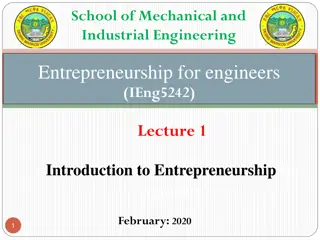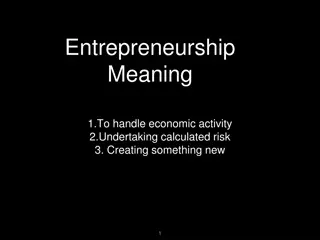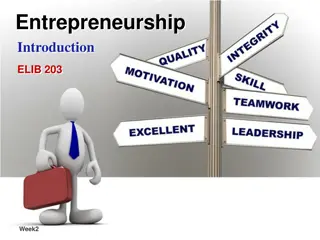Concept of Entrepreneurship and Characteristics of an Entrepreneur
Entrepreneurship development explores the essence of entrepreneurship, role in economic development, new trends, evaluating 21st-century entrepreneurship, and project identification. Understanding the history of entrepreneurship and the definition and nature of entrepreneurs are integral parts of the subject.
Download Presentation

Please find below an Image/Link to download the presentation.
The content on the website is provided AS IS for your information and personal use only. It may not be sold, licensed, or shared on other websites without obtaining consent from the author.If you encounter any issues during the download, it is possible that the publisher has removed the file from their server.
You are allowed to download the files provided on this website for personal or commercial use, subject to the condition that they are used lawfully. All files are the property of their respective owners.
The content on the website is provided AS IS for your information and personal use only. It may not be sold, licensed, or shared on other websites without obtaining consent from the author.
E N D
Presentation Transcript
Entrepreneurship Development Unit- I Entrepreneur. Concept of Entrepreneur. Meaning. Definition. Characteristics. Functions. Entrepreneurs and entrepreneur. Role of an Entrepreneur in Economic Development.
Unit II Entrepreneurship. Concept. Meaning. Definition. Characteristics. Importance of Entrepreneurship. Challenges , Issue and Barriers of Entrepreneurship.
Unit - III - The Dynamic New Trends of Entrepreneurship. Startup accelerators. Students sand box and business labs. Crowd funding. Venture capital. Co-working spaces. Boot camps. Online Entrepreneurship Degree.
Unit IV Evaluation of Entrepreneurship in 21stCentury Essential of 21stcentury Entrepreneurship. Importance of Entrepreneurship in 21stcentury. Start-up Schemes. Start-up India. Pradhan Mantri Kaushalya Vikas Yojna. Skill India.
Unit V Project Identification Meaning. Definition. Classification. Project life, Project Formulation and Feasibility. Information Centers in India.
DEFINITION,NATURE AND DEFINITION,NATURE AND CHARACTERISTICS OF AN ENTREPRENEUR CHARACTERISTICS OF AN ENTREPRENEUR HISTORY: The word entrepreneur' is derived from the French word entreprendre which means to undertake . In the early 16thcentury the French men who organised and led military expeditions were referred to as entrepreneur'. After 1700,the term was applied to other types of adventures, mainly civil engineering like constructions of roads etc.
DEFINITION DEFINITION J.B.SAY: J.B.SAY: Is another Frenchman, expanded Cantillon s ideas and conceptualised the entrepreneur as an organiser of the business firm, central to its distributive and productive functions. E.E.HAGEN: E.E.HAGEN: The entrepreneur is an economic man,who tries to maximise his profits by innovations. GALBRAITH: GALBRAITH: People are poor because they prefer in that way . An entrepreneur must accept the challenge and should be willing hard to achieve something.
CHARACTERISTICS OF AN CHARACTERISTICS OF AN ENTREPRENEUR ENTREPRENEUR 1. 2. 3. 4. 5. 6. 7. 8. 9. 10. Equipped with Capability to drive Calculated Risk-taker Innovator Organiser Creative Achievement Motivated Technically Competent Self-confident Socially Responsible Optimistic
11. Blessed with Mental Ability 12. Human Relations Ability 13. Communication Ability 14. Decision-Making 15. Business Planning 16. A venture Capitalist 17. Visionary 18. Entrepreneur make significant differences 19. Ability to Spot and Exploit Opportunities 20. Courage to Face Adversities 21. Leadership---An essential trait of the entrepreneur
Functions of Entrepreneur Good Relations It is necessary to maintain healthy working atmosphere in an organization. It depends upon the efficient relations between subordinates and superiors. Coordination's among the employees is the key of success. Organizing funds Entrepreneur needs to find out different financial resources because adequate and continues finance is always necessary for every business. New Technology In global world, everyday there is an invention of new Technology. Introduction of new Technology will always result in growth of business e.g. new machinery, advance technology, new and scientific methods of productions etc. Taking Designs An entrepreneur has to take wise decisions for his enterprise. Timely and correct decisions are also important and necessary for a proper business plan. he should always consider pros and cons before taking any business decision.
Cont.. Determination of Objectives An entrepreneur has to determine the aims and objectives of the business. There may be difference between primary and secondary objectives of the enterprise, He can change these objectives as per the market situations. Development of Market The entrepreneur has to find out different ways for marketing the products and services of his enterprise. He can conduct surveys of research to understand the customers demand. When the markets are developed constantly, demands of the consumers will increase. Innovation
TYPES OF ENTREPRENEUR TYPES OF ENTREPRENEUR 1. 1. i. i. According to the Type of Business According to the Type of Business Business entrepreneur: Business entrepreneur: Business entrepreneurs are those entrepreneurs who conceive the idea of a new product or service and then translate their ideas into reality. Trading entrepreneur: Trading entrepreneur: As the every name indicates trading entrepreneur is concerned with trading activities and not manufacturing. iii. Industrial entrepreneur: Industrial entrepreneur: As the very name indicates, an industrial entrepreneur is one who sets up an industrial unit. iv. iv. Corporate entrepreneur: Corporate entrepreneur: Corporate entrepreneur is the one who plans, develops and manages a corporate body. v. v. Agricultural entrepreneur: Agricultural entrepreneur: Agricultural entrepreneur is the one who is engaged in the agricultural activities. ii. ii. iii.
2 2. According to Motivation . According to Motivation i. i. Pure entrepreneur: Pure entrepreneur: Pure entrepreneur is one who may or may not possess an aptitude for entrepreneurship but is tempted by the monetary rewards or profits to be earned from the business venture. Induced entrepreneur: Induced entrepreneur: Induced entrepreneur is attracted by the various incentives, subsidies and facilities offered by the government. ii. ii.
3.According to the Use of 3.According to the Use of Technology Technology i. i. Technical entrepreneur: Technical entrepreneur: The strength of a technical entrepreneur is in his skill in production techniques. . He concentrates more on production than on marketing. Non Non- -technical entrepreneur: technical entrepreneur: Unlike technical entrepreneur, non-technical entrepreneur is not concerned with the technical aspect of the product rather he spends more time in developing alternative strategies of the marketing and distribution to promote his business. iii. Professional entrepreneur: Professional entrepreneur: Professional entrepreneur means an entrepreneur who is interested in floating a business but does not want to manage or operate it. ii. ii. iii.
4.According to stages of Development 4.According to stages of Development i. i. First generation entrepreneur: First generation entrepreneur: First generation entrepreneur are those entrepreneur who do not possess any entrepreneurial background. Second generation entrepreneur: Second generation entrepreneur: Second generation entrepreneur are those entrepreneurs who inherit the family business firms and pass it from one generation to another. iii. Classical entrepreneur Classical entrepreneur: A classical entrepreneur is a stereotype entrepreneur whose aim is to maximize his economic returns at a level consistent with the survival of the unit but with or without an element of growth. ii. ii. iii.
5.Classification Given by Dan of 5.Classification Given by Dan of i. i. Innovating entrepreneur: Innovating entrepreneur: Innovative entrepreneurs are generally aggressive and possess the art of cleverly putting the attractive possibilities into practice. Imitative entrepreneurs Imitative entrepreneurs: Imitative entrepreneurs are characterised by readiness to adopt successful innovations inaugurated by successful innovating entrepreneurs. Fabian entrepreneur Fabian entrepreneur: Fabian entrepreneurs are cautions and skeptical in experimenting change in their enterprises. Such entrepreneurs are shy, lazy and lethargic. Drone entrepreneur Drone entrepreneur: Drone entrepreneurs are characterised by a refusal to adopt opportunities to make changes in production formulae even at the cost of severely reduced returns. ii. ii. iii. iii. iv. iv.
6.According to Capital ownership 6.According to Capital ownership i. i. Private entrepreneur: Private entrepreneur: When an individual or a group of individuals set up an enterprise, arrange finance, bear the risk and adopt the latest techniques in the business with the intention to earn profits, he or the group is called as private entrepreneur/entrepreneurs. State entrepreneur State entrepreneur: As the name indicates, state entrepreneur means the trading or industrial venture undertaken by the state or the government itself. iii. Joint entrepreneur Joint entrepreneur: Joint entrepreneur means the combination of private entrepreneur and state entrepreneur who join hands. ii. ii. iii.
7 According to Gender and Age According to Gender and Age i. i. ii. ii. Woman entrepreneur Woman entrepreneur iii. iii. Young entrepreneur Young entrepreneur iv. iv. Old entrepreneur Old entrepreneur v. v. Middle Middle- -aged entrepreneur aged entrepreneur Man entrepreneur Man entrepreneur
8.According to Area 8.According to Area i. i. ii. ii. Urban entrepreneur Urban entrepreneur Rural entrepreneur Rural entrepreneur
9.According to Scale 9.According to Scale i. i. ii. ii. iii. iii. iv. iv. Large scale industry entrepreneur Large scale industry entrepreneur Medium scale industry entrepreneur Medium scale industry entrepreneur Small scale industry entrepreneur Small scale industry entrepreneur Tiny industry entrepreneur Tiny industry entrepreneur
Meaning of Entrepreneur: A person within a large corporation who takes direct responsibility for turning an idea into a profitable finished product through assertive risk-takingand innovation Entrepreneurs provide the spark. Entrepreneur keep the flame going. Entrepreneurs are found anywhere their vision takes them. Entrepreneur work within the confines of an organization.
Entrepreneurs face many hurdles, and are sometimes ridiculed and riddled with setbacks. Entrepreneurs may sometimes have to deal with conflict within the organization. Entrepreneurs may find it difficult to get resources. Entrepreneurs have their resources readily available to them.
Entrepreneurs may lose everything when they fail. Entrepreneurs still have a paycheck to look forward to (at least for now) if they fail. Entrepreneurs know the business on a macro scale. Entrepreneurs are highly skilled and specialized.
FUNCTIONS OF AN ENTREPRENEUR FUNCTIONS OF AN ENTREPRENEUR There has been a great deal of confusion and contradiction in literature on the functions of an entrepreneur. FUNCTIONS FUNCTIONS 1. 1. Innovations Innovations: J.Schumpeter has made substantial contribution to the literature of entrepreneurship. The process of innovations may be in the form of: a) Introduction of a new product. b) Use of new methods of production. c) Opening of a new market. d) The conquest of new source of supply of raw material. e) A new form of organisation.
2. Risk 2. Risk- -taking: taking: Richard cantillon states that entrepreneur is an agent who buys means of production at certain prices and sells them at uncertain prices. The entrepreneur performs the function of reducing uncertainty in his plan of investment and expansion of the enterprise. J.b. Say also stresses risk-taking as the specific function of an entrepreneur. 3. Decision Maker: 3. Decision Maker: Entrepreneur as a decision maker describes the following functions of an entrepreneur. a) The determination of objectives of an enterprise and the change of those objectives as conditions required or made advantageous, b) The development of an organisation including efficient relations with subordinates and all employees,
c) c) Securing adequate financial resources, the relations with existing and potential Investors, d) The acquisition of efficient technological equipment and the revision of it as new machinery appears, e)The development of a market for the products and the devising of new products to meet or anticipate consumer s demand, f) The maintenance of good relations with public authorities and with society at large.
4. Organisation and Management: 4. Organisation and Management: Marshall recognised organisation and management of the enterprise as the important functions of an entrepreneur. When the organisation grows bigger, the entrepreneur effectively delegates authority and finds responsibility at various levels of management. The network of decision making becomes more complex. The functions of organisation and management includes: a) Planning of an enterprise, b) Co-ordination, administration and control, c) Routine type of supervision.
Role of Entrepreneurship in economic development (1) Promotes Capital Formation: Entrepreneurs promote capital formation by mobilizing the idle savings of public. They employ their own as well as borrowed resources for setting up their enterprises. Such types of entrepreneurial activities lead to value addition and creation of wealth, which is very essential for the industrial and economic development of the country. (2) Creates Large-Scale Employment Opportunities: Entrepreneurs provide immediate large-scale employment to the unemployed which is a chronic problem of underdeveloped nations. With the setting up. Of more and more units by entrepreneurs, both on small and large-scale numerous job opportunities are created for others. As time passes, these enterprises grow, providing direct and indirect employment opportunities to many more. In this way, entrepreneurs play an effective role in reducing the problem of unemployment in the country which in turn clears the path towards economic development of the nation.
(3) Promotes Balanced Regional Development: Entrepreneurs help to remove regional disparities through setting up of industries in less developed and backward areas. The growth of industries and business in these areas lead to a large number of public benefits like road transport, health, education, entertainment, etc. Setting up of more industries lead to more development of backward regions and thereby promotes balanced regional development. (4) Reduces Concentration of Economic Power: Economic power is the natural outcome of industrial and business activity. Industrial developments normally lead to concentration of economic power in the hands of a few individuals which results in the growth of monopolies. In order to redress this problem a large number of entrepreneurs need to be developed, which will help reduce the concentration of economic power amongst the population.
(5) Wealth Creation and Distribution: It stimulates equitable redistribution of wealth and income in the interest of the country to more people and geographic areas, thus giving benefit to larger sections of the society. Entrepreneurial activities also generate more activities and give a multiplier effect in the economy. (6) Increasing Gross National Product and Per Capita Income: Entrepreneurs are always on the look out for opportunities. They explore and exploit opportunities,, encourage effective resource mobilization of capital and skill, bring in new products and services and develops markets for growth of the economy. In this way, they help increasing gross national product as well as per capita income of the people in a country. Increase in gross national product and per capita income of the people in a country, is a sign of economic growth.
Continue.. Living of standard Increase in the standard of living of people in a community is yet another key goal of economic development entrepreneurs again play a key role in increasing the standards of living in community. Exports Any growing business will eventually want to get started with exports to expand their business to foreign markets. Key benefit is that this expansion that leads to more stable business revenue during economic downturns in the local economy. Community development Community development requires infrastructure for education and training, health care and other public services Circulation of money Optimal use of Resources
Difference between entrepreneur and Difference between entrepreneur and intrapreneur intrapreneur 1. An entrepreneur is an independence person who starts his venture and bears full risk of his failure and enjoys the fruit of his success whereas intrapreneur is partially independent and is sponsored by the corporation in which he is working. He is also not liable to bear the losses in case of his failure. An entrepreneur raises the finance from various sources and also guarantees their return whereas an intrapreneur does not own responsibility to raise the capital or to return it. An entrepreneur has no relation with any organisation whereas an intrapreneur operates within the organisation where he is working. 2. 3.























